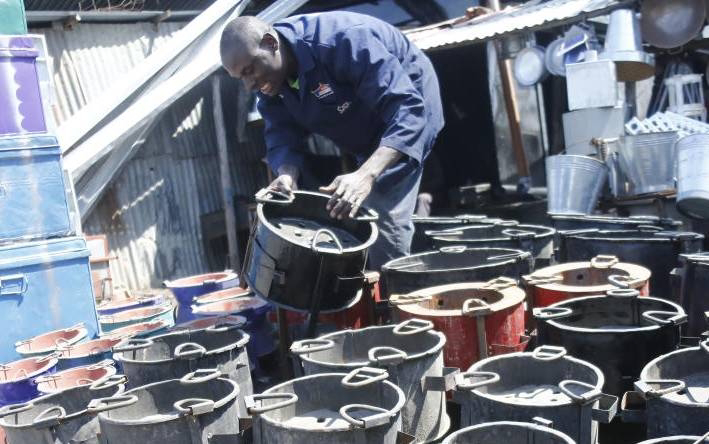Richard Muteti: Sensitising the Jua Kali Sector is Key in Expanding Tax
Chief Executive Officer,Kenya National Federation of Jua Kali Associations & Confederation of Micro and Small Enterprises Organization East Africa (CMSEO-EA), Mr Richard Muteti gives his opinion on why Jua Kali sector it's important in the growth of the economy.
The Jua Kali sector, the majority of whom are the MSMEs, plays a key role in the country’s development agenda. According to the Kenya Economic Survey Report 2022, the Jua Kali sector contributed 25% of the GDP. The role of the Jua Kali sector in the economy cannot therefore be underestimated.
It is estimated that there are more than 16.4 million Informal Sector players majority of whom are MSMEs in Kenya, which accounts for 93 per cent of the total labour force.
However, the sector has proven difficult to tax because the enterprises in this sector are not formally regulated, payments are mostly made in cash and some business records are not consistent owing to the nature of their informal business operating systems.
In the recent conversations around increasing the tax base as the government seeks to promote growth and boost governance, it has emerged that Taxing the informal/MSMEs Sector requires a specialised domesticated approach to accommodate the sector's unique needs and facilitate significant economic growth.
We note that KRA has established initiatives under the tax base expansion programme to help bring the sector into the tax bracket. The potential taxable base of the informal sector is approximated to be in billions of shillings.
This, therefore, brings the need for KRA to partner with the sector and design adequate strategies and collaborative policy interventions to enable the Authority to encourage the segment into the tax bracket.
This can be achieved through various ways, including harmonising taxes to reduce the multiplicity of taxes and educating jua kali traders to appreciate the need for paying taxes.
One of the most effective ways of addressing non-compliance is through quality and efficient tax processes. It is envisaged that where the tax processes are efficient, then voluntary compliance among taxpayers is prompted.
Over the past few years, the Kenyan government has changed its stance, recognizing jua kali as a valuable source of jobs creation. The government has allocated funds to support growth in the sector under the Bottom Up Economic Agenda (BETA).
The sector is now collaborating with various state agencies to create a conducive business operating environment.It is for this reason that the Jua Kali sector is in talks with KRA to address the possibility of an institutionalized relationship between the sector and the Authority.
This partnership is anticipated to create a symbiotic environment to enable the sector to grow and efficiently contribute its fair share to the economic development of the country while KRA establishes structures that will help lower the overall tax burden on the sector by reducing tax compliance costs, Complexity of tax administration processes including filing of returns, and thereby lowering the overall tax burden on small businesses.
The sector is also engaging other relevant agencies to ensure a seamless synergy with the partners.Beside the engagements, KRA should also establish policies that address the sectors dynamic needs, provide incentives, develop easier export facilities and enhance accessibility to reliable taxpayer services.
The Authority can partner with the sector to develop programmes aimed at creating awareness which include roundtable engagements, establishment of more jua kali sector help desks at the Tax Service Offices, tax education programmes customised for the Jua Kali Sector among other initiatives.
This is because most of the sector players are not well versed with the applicable taxpaying processes. The traders earn hourly, half-day wages and monthly income making this sector unique in comparison with formally established companies.
KRA should also partner with the Sector to spearhead a joint national taxpayer recruitment drive amongst the sector players.
Additionally, the launch of the policy and legal framework for Recognition of Prior Learning (RPL) is long overdue. The jua kali sector stands to be the biggest beneficiary of a robust and comprehensive RPL system as their occupational practice will have a policy framework to guide and promote fairness and equity in the commercialisation of their skills and hard-earned competencies.
This will subsequently increase the earnings and enhance revenue remittance.The policy would also address unfairness in tendering for contracts, which often locks out jua kali artisans and craftsmen due to lack of formal certifications. It will promote occupational standardisation and facilitate career progression for artisans and crafts persons.
The informal sector is aware that the government depends on taxes to meet its expenditure and provide services to the citizens, therefore, Tax payment ought to be a civic responsibility while Taxation to the Informal/MSME sector should be facilitative and not prohibitive.
We pledge to work together with KRA in finding ways of addressing the high transaction costs in meeting tax obligations by the Jua Kali sector, Complexity of tax administration processes including filing of returns towards creating a tax system that is simpler , efficient , fair and equitable.
Tax policies should promote the growth of the long standing Jua Kali sector in Kenya







Comments
Post a Comment